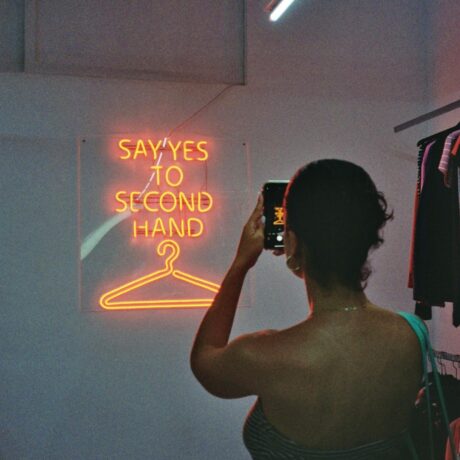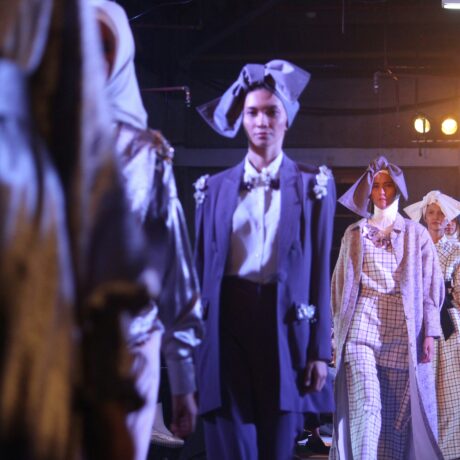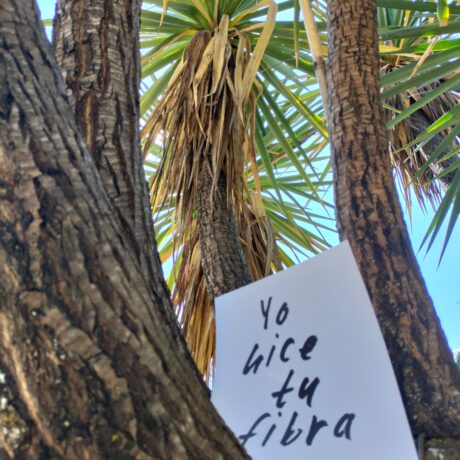The Nest Guild Members show how producers and artisans are responding to Covid-19
This Fashion Revolution Week, The Nest has joined Fashion Revolution in asking #whomademyclothes. The Nest are a US based non-profit working globally to build a new handworker economy to increase global workforce inclusivity, improve women’s wellbeing beyond factories, and preserve important cultural traditions around the world. The Nest Guild is a global network of more than 700 artisan business based in over 100 countries around the world. While employing artisans practicing diverse crafts from shibori dyeing to hand reed weaving, Guild businesses are unified in their common goals for business growth and social improvement in their local communities.
During this week, brands and producers demonstrate transparency in their supply chains by featuring information and images across social media about their production process and the skilled handworkers behind the products. Many members of the Nest Artisan Guild, a network of over 700 artisan enterprises with a footprint in over 100 countries, join the movement by sharing their brand stories online.
Fashion Revolution Week usually combines online and offline campaigning and activities but this year it has moved entirely online due to the Covid-19 pandemic. In response, participants are finding creative ways to bring their initiatives online in a dual effort to raise awareness around conscious consumption and production, while building and supporting their communities through these uncertain times.
Nest partnered with Fashion Revolution to share the inspiring community-building initiatives Guild Members are leading this Fashion Revolution Week through digital methods.
Idia’Dega Builds a Dress From Swatches Sent by Mail
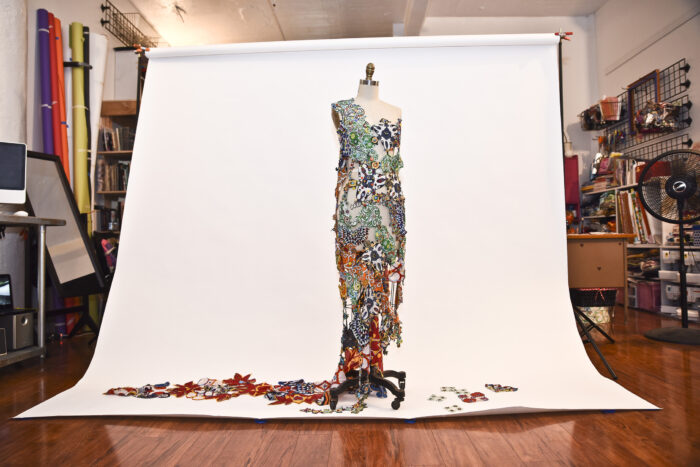
Terenah Idia, founder and designer of Pittsburg-based Guild business Idia’Dega, shares the story behind their work and their project OAM: A Creative Community Response to COVID-19.
Idia’Dega is a global eco-design collaboration of women artisans from around the world. Incorporating Indigenous adornment and traditional textile arts in sustainable design. The collaboration includes maasai, oneida and african-american designers and artisans
IdiaDega is built on creative community and working together even at a distance. When COVID-19 enveloped the world I wanted to do something that captured the spirit of IdiaDega in my community. So OAM: A creative community response to COVID-19 was created. The inspiration is the Three Rivers and Golden Triangle, the confluence created by the Allegheny and Monongahela rivers from the Ohio River in Pittsburgh. I have asked people to send small 4 inch approx sized fabric art – it can be cut up from an old shirt or newly crocheted piece, any sewable piece that will form a garment created in community while maintain physical distancing. While we are physically distant we can be creatively connected.
The inspiration for the dress is the Three Rivers and Golden Triangle which are created by the confluence of the Allegheny and Monongahela rivers which stem from the Ohio River here in Pittsburg. Imagine the Golden Triangle as the proud neck of the dress, with the Allegheny and Monongahela rivers as cascading sleeves, and the mighty Ohio as the long train. The project symbolizes the coming together of disparate pieces from afar to create something beautiful together.”
Learn more about the project and how you can take part here.
Freeset Global Creates a DIY No-sew Mask Tutorial
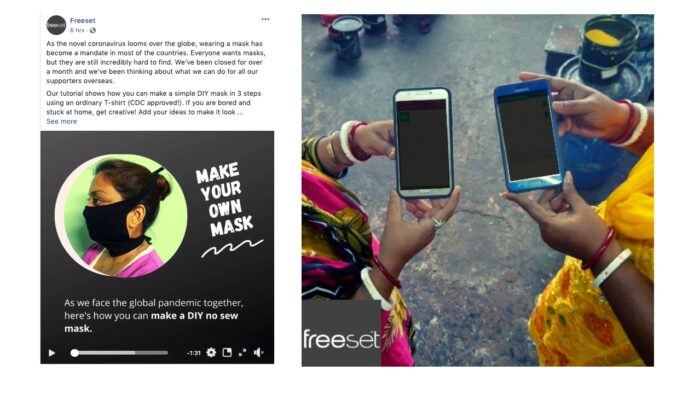
Nancy Knapp, Chief Business Development Officer Freeset Global based in India, shares the DIY no-sew mask tutorial Freeset Global artisans developed as a simple way for anyone to create a protective mask in India where local infrastructure is disrupted by complete lockdown.
The vision of Freeset Global is to transform individuals and communities through business. We seek to provide women opportunities for dignified employment in a supportive community- to provide a choice where they had none. Freeset began in Sonagachi, one of Asia’s largest red-light areas with ~10,000 sex workers, many of whom were taken from homes in villages and communities across West Bengal. Our women hoped for something better. Through jobs at Freeset making bags and tees, we worked to build new homes and a new community of freedom in Kolkata. We launched Freeset Trust to provide better counseling and care for staff and community.
We believe every person needs a community to belong to. At Freeset, we live in communities marked by extreme poverty and vulnerability. Our people are world-battlers, fighting daily for the good of their families and neighbors. We want to see freedom prosper in our communities, with every person having a chance to not only feed and clothe themselves but ultimately reach their full potential.
In 2014, our women started dreaming about returning to their ancestral homes, so we visited communities in the Murshidabad district (rural West Bengal) and now have two new businesses in strategic locations. We’ve seen some of our women return home to work in these businesses. Better still, through our presence we’re helping communities ensure their daughters are never trafficked away.
Social distancing does not have to mean social disconnecting. Although all of our operations remain closed during the current lockdown period in India, we are continuing to interact with the community and Freeset Global artisans via phone. We have created multiple message groups for different communities to stay connected. These groups help to share updates and act as a helpline for the women in our community. We also ensure our leaders are having regular one-to-one phone conversations, and people share encouraging photos of how they are spending time at home. We all need the support of one another!
As the novel coronavirus looms over the globe, wearing a mask has become a mandate in most countries, including India. Everyone is in need of masks, but they can be incredibly hard to find, particularly in India where the country is on total lockdown. Our operations have been closed for over a month, so we have been thinking about what we can do to support our community here in India and overseas. We created a step-by-step DIY no-sew mask tutorial which shows how you can make a simple DIY mask in 3 steps using an ordinary T-shirt or another tightly woven material to protect yourself and your loved ones.
Mayamiko Translates COVID-19 Resources into Local Language & Shares At-home Craft Activities
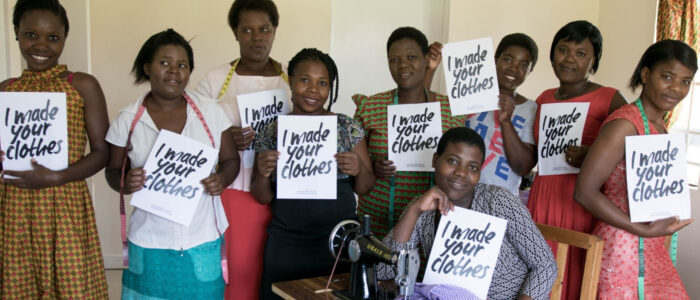
Paola Masperi, Founder of made-in-Malawi Mayamiko, shares the COVID-19 educational resources they are translating into local languages, and the fun and free at-home craft activities they are sharing across social media.
Mayamiko is an ethical and sustainable woman’s wear and lifestyle brand, producing apparel, accessories and homegoods, lovingly made in Malawi by our team of tailors, pattern cutters and seamstresses. I founded Mayamiko with the desire to create sustainable livelihoods through craft-based production, creativity, storytelling and fairer trade practices, particularly for women.
Mayamiko works in partnership with Mayamiko Trust, our sister charity. Through the Mayamiko Trust we hope to offer women choices for their own lives, and we see education as the key to unlock these choices. So, we focus on providing free quality training in tailoring and sewing, business and entrepreneurship education, as well as access to grants and microfinance.
The Charity and brand work together through the Mayamiko Fashion Lab where our garments are made. The Mayamiko Fashion Lab was designed to provide training, education, nutrition, sanitation and fairer trade practices to all of those involved. The project currently provides training in sewing and tailoring as well as financial and business skills to local, disadvantaged women, many of whom are affected by the HIV pandemic or who are carers of HIV orphans. After their training all trainees receive a recognised qualification as well as mentoring, guidance and access to a micro-finance scheme, enabling them to start their own business or staying on to work with Mayamiko.
As the COVID-19 pandemic unfolded around the world, we decided that the safest thing was for our teams to work from home. Since, we have pivoted production to produce fabric masks which current Fashion Lab students and Mayamiko seamstresses are sewing from their homes. We are also happy to be able to provide employment sewing masks during this time to past Fashion Lab graduates who have set up their own businesses but are currently grounded at home.
We have set up systems to safely distribute raw materials and collect the finished masks. We were able to nimbly shift to this new production system because each seamstress has a sewing machine at home provided through our sewing machine grants. These machines have proven to be a real relief during this time of crisis by providing our artisan partners the opportunity to continue to earn an income safely from home.
We continue to pay full salaries and plan to do so as long as possible. We keep in touch with everyone on a daily basis through WhatsApp and send each other pictures of what ‘working from home’ looks like for each of us.
In addition to providing a source of income, we also want to help our community stay healthy and safe. We created a number of educational resources including easy to read flashcards translated into local languages that can be shared digitally to help spread messages on how to stay safe. We have also created a mask-making pattern and tutorial to empower people to make their own masks, cheaply and easily at home.
We are encouraging those who are able to, to ‘pay it forward’ and sponsor a face mask. This allows us to keep donating masks to those in need and allows us to provide employment to our artisan partners. We also want to care for and acknowledge our customers, so our artisan partners in Malawi created a simple scrunchie making tutorial to help our community do something crafty at home!”
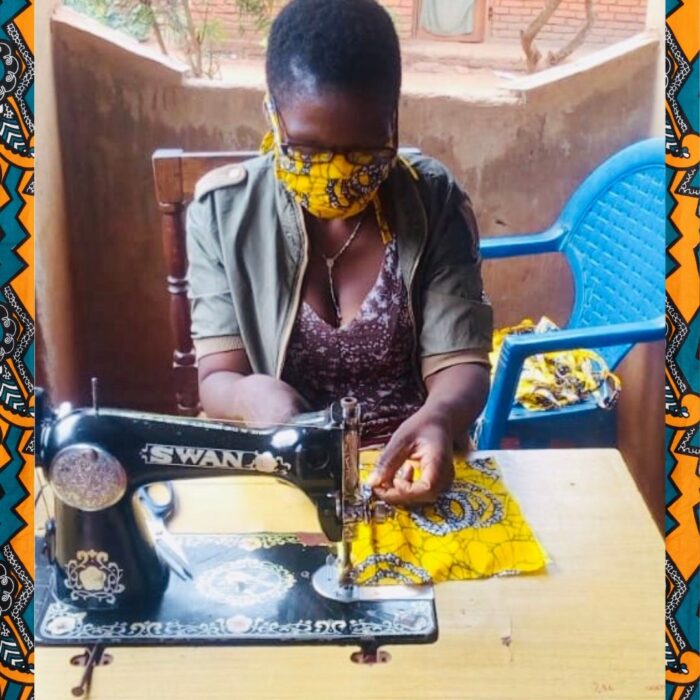
Threads of Peru Shares their Craft Story and Connects to their Mission
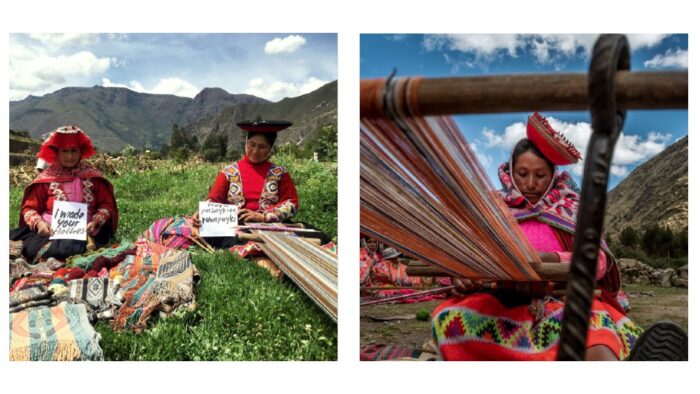
Ligia Gómez, Project Coordinator and Sales Consultant at Peru-based Guild business Threads of Peru, shared the story and mission behind the brand and how they are keeping that mission alive throughout this moment of grounded operations.
Threads of Peru works with weaving cooperatives in four regions of Cusco, namely the Sacred Valley, the Patacancha Valley, the Mapacho River Valley, and Ausangate, creating handwoven items such as ponchos, scarves, bags and home textiles. Each group has unique strengths in terms of skills and products, and offer different pallays (traditional woven designs), according to how their weaving tradition evolved.
Our founders saw how these beautiful traditions were disappearing and partnered with the weaving communities to preserve their weaving traditions and provide a sustainable source of income. Today, we continue to be inspired by our mission to preserve this craft and serve as a source of supplemental income for traditional weavers living in remote communities.
Traditional weavers start learning to weave at an early age from their mother and grandmothers. Traditional clothing is woven this way and children begin learning the craft as young as five years old, first by spinning yarn and then weaving simple patterns into belts, to ensure they are able to produce their own clothing in the future.
Most of the weavers we work with live in remote areas and people are currently unable to leave their homes in Peru so we are staying connected with our artisan partners via phone. We are checking in on peoples’ wellbeing and reassuring our partners that we are doing our best to keep our doors open and ensure that we will be here after markets reopen.
We are staying connected with our global community online through our Instagram and website. Last week we launched a giveaway campaign to help generate income so our staff is able to remain employed and to be able to reinvest in production when possible. Reinvesting in production means work for the weavers and sewers, and also supports our local yarn, dye and leather suppliers.
NDOPCraft Pivots Production to Masks for Donation to Support Local Community
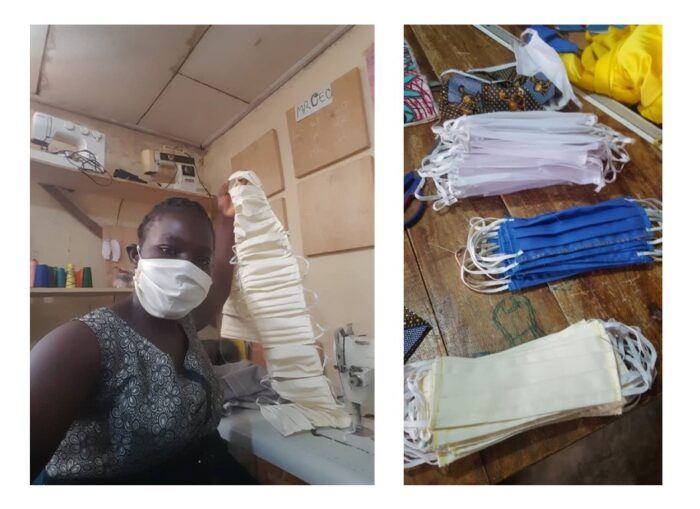
Nungow Gabe David, the President and Founder of NDOPCraft an ethical and fair trade organisation based in Cameroon tells us about NDOP’s efforts to provide protective masks to frontline workers.
The main objective of NDOPCraft is to improve the wellbeing and safeguard the livelihoods of marginalised producers, especially women, by providing training and non-exploitative professional marketing services based on ethical and fair trade principles between our local producers and formal market outlets. We produce baskets, table mats, knitted products, embroidery, and other textile products, which are sold through ethical, sustainable and fair trade channels around the round.”
Our greatest goal is to provide protective masks to those in need in our home country, Cameroon, to ensure no one is left behind and create jobs for local artisans during this difficult time. You can sponsor a mask for a frontline worker while employing artisans like NDOPCraft through Nest’s PPE Purchasing Initiative here.
With thanks to Meghan Black, Director of Artisan Communications for making this article possible.
buildanest.org // @buildanest // Visit The Nest Guild Members’ Fashion Revolution Week page




